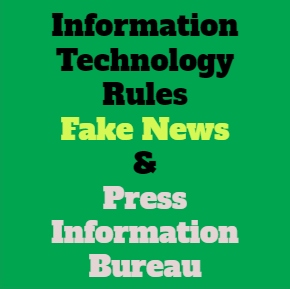

By Our Editorial Team
First publised on 2023-01-20 10:46:01
Some parts
of the draft Information Technology Rules that the government has put in public
domain are likely to have an adverse effect on journalism as we know of it. The
Rules require that the Press Information Bureau (PIB), a Central government agency,
will decide what constitutes 'fake news' and once it decides so for a
particular piece of news, it must be taken down. The government has also
empowered its departments to authorize any other agency to check facts and
declare a piece of news 'fake' if it pertains to any government department. The
Editor's Guild of India has said that it will have the effect of gagging the
media as it will give the government "a carte blanche to determine what is fake
or not with respect to its own work".
If one sees
it objectively, the government or its departments are best suited to know
whether a piece of news emanating from its departments is genuine or fake. But
that is not always the case as any government cherry picks news and dispenses only
those items that project it in a good light. But the media has its sources (who
often prefer anonymity) who give it inside information that may be critical of
the government or its policies or disclose how a particular scheme has flopped.
Credible news organizations have many layers of checks and do not publish any
news item without solid verification. Over the ages, through self-regulation
and standard practices, renowned media organizations have in place a system whereby mistakes are
promptly acknowledged by issuing apologies, corrections, presenting the other
side of the story or even withdrawing the item completely in some cases. Over
and above this, the government has the option of issuing a denial which is published by these media organizations with due prominence. This system
has been working well and there is no need to change it.
Fake news
has been defined as false or misleading information presented as news. There
are many online 'media' outlets that have been publishing such news without any
verification. The idea is to sensationalize news to create controversy and grab
eyeballs. Most often, these 'media' outlets are of dubious origin and are started
with an agenda. There are many ways that the government can prosecute such
outlets and it has in fact been doing so. But if the government now puts these
Rules into practice for all media organizations, it will kill the freedom of the
press and most news will then be published only from the handouts given by the
PIB.











